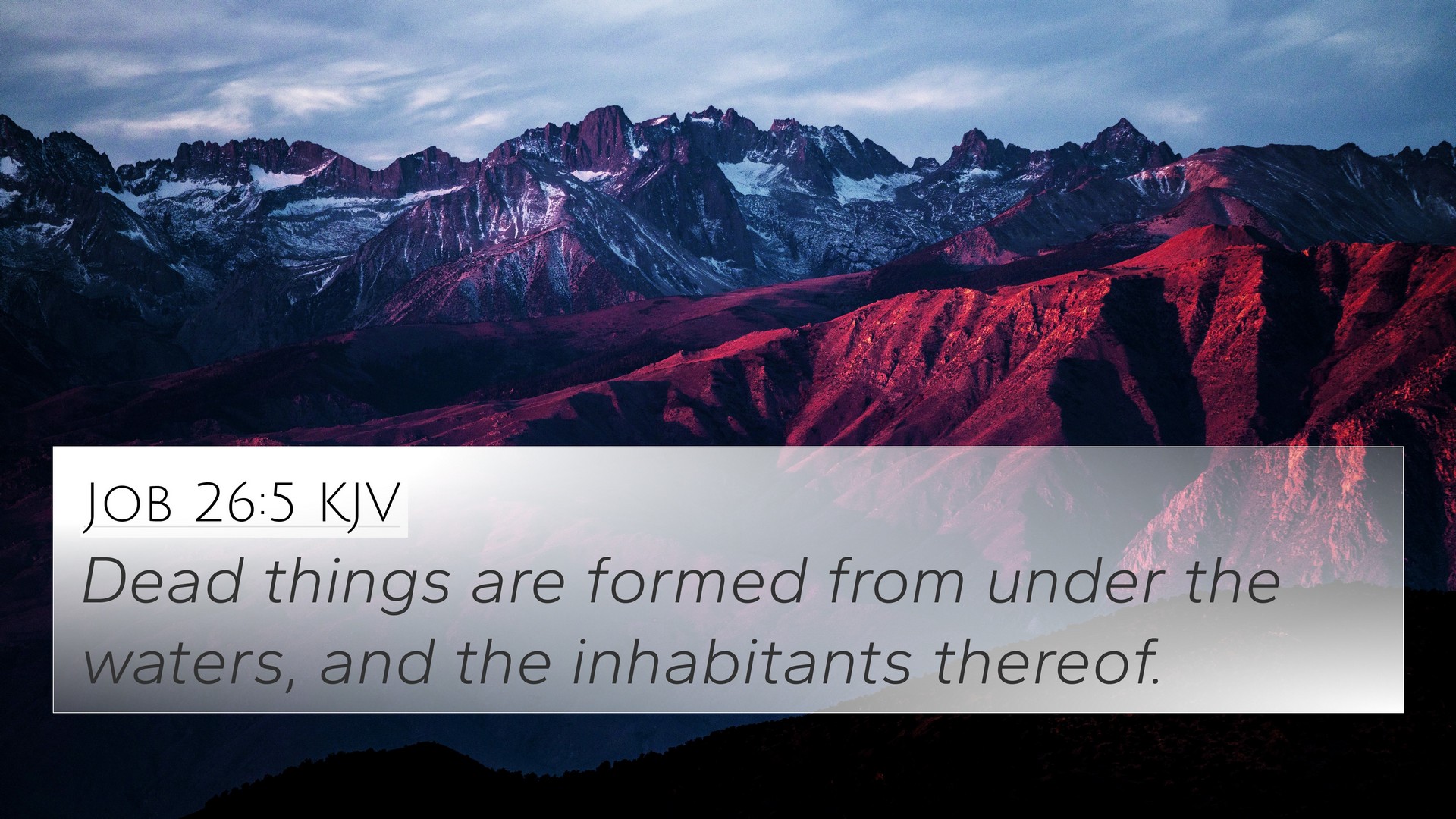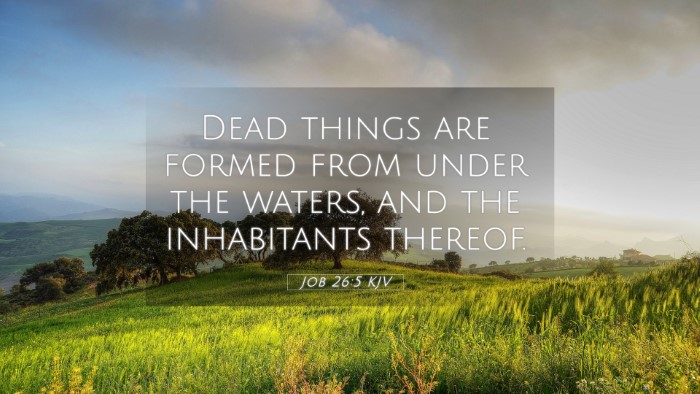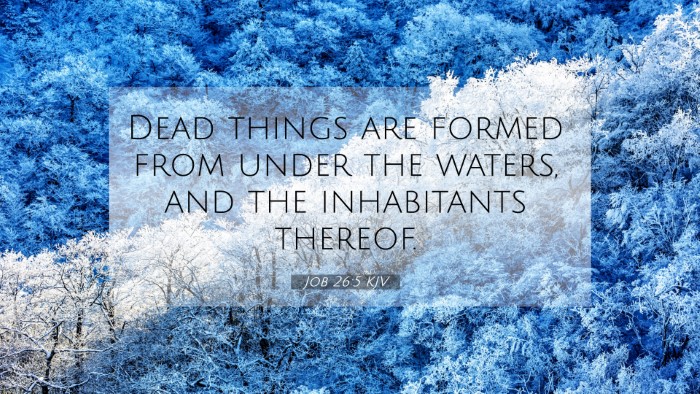Old Testament
Genesis Exodus Leviticus Numbers Deuteronomy Joshua Judges Ruth 1 Samuel 2 Samuel 1 Kings 2 Kings 1 Chronicles 2 Chronicles Ezra Nehemiah Esther Job Psalms Proverbs Ecclesiastes Song of Solomon Isaiah Jeremiah Lamentations Ezekiel Daniel Hosea Joel Amos Obadiah Jonah Micah Nahum Habakkuk Zephaniah Haggai Zechariah MalachiJob 26:5 Similar Verses
Job 26:5 Cross References
Dead things are formed from under the waters, and the inhabitants thereof.
Uncover the Rich Themes and Topics of This Bible Verse
Listed below are the Bible themes associated with Job 26:5. We invite you to explore each theme to gain deeper insights into the Scriptures.
Job 26:5 Cross Reference Verses
This section features a detailed cross-reference designed to enrich your understanding of the Scriptures. Below, you will find carefully selected verses that echo the themes and teachings related to Job 26:5 KJV. Click on any image to explore detailed analyses of related Bible verses and uncover deeper theological insights.
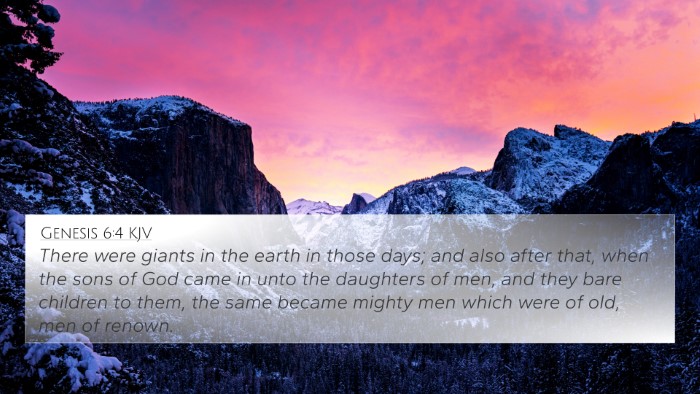
Genesis 6:4 (KJV) »
There were giants in the earth in those days; and also after that, when the sons of God came in unto the daughters of men, and they bare children to them, the same became mighty men which were of old, men of renown.
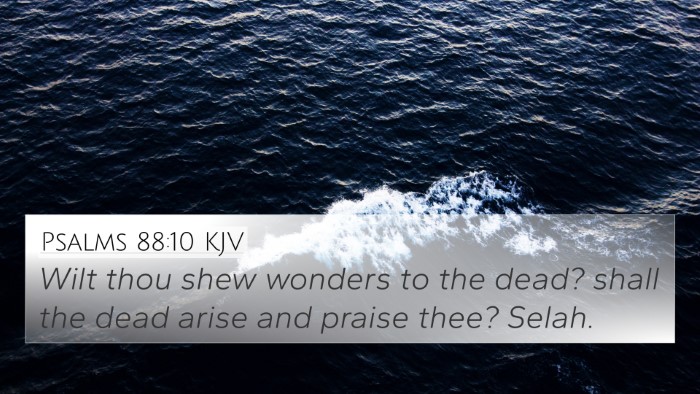
Psalms 88:10 (KJV) »
Wilt thou shew wonders to the dead? shall the dead arise and praise thee? Selah.

Job 41:1 (KJV) »
Canst thou draw out leviathan with an hook? or his tongue with a cord which thou lettest down?

Psalms 104:25 (KJV) »
So is this great and wide sea, wherein are things creeping innumerable, both small and great beasts.

Ezekiel 29:3 (KJV) »
Speak, and say, Thus saith the Lord GOD; Behold, I am against thee, Pharaoh king of Egypt, the great dragon that lieth in the midst of his rivers, which hath said, My river is mine own, and I have made it for myself.
Job 26:5 Verse Analysis and Similar Verses
Understanding Job 26:5
Job 26:5 reads: "The dead tremble, those under the waters and those inhabiting them." This verse comes from a larger discourse where Job responds to the misconceptions voiced by his friends about God's power and His governance of the universe.
Verse Meaning and Interpretations
In this verse, Job highlights the fear and awe that even the dead have in the presence of God. The significance of this observation is profound.
- Matthew Henry's Commentary: Henry explains that even the dead feel the weight of God's presence. They are not in a state of complete oblivion, and the phrase "under the waters" can extend to the fear of those who inhabit the depths of the earth and the seas.
- Albert Barnes' Commentary: Barnes points out that this verse is reflective of God’s universal authority. The dead, under the earth and in the oceans, symbolize all forms of existence, emphasizing that God's might and sovereignty are inescapable even in death.
- Adam Clarke's Commentary: Clarke suggests that this serves as a reminder of the enormity of God's power and the recognition of His might even amongst the deceased entities. He emphasizes a relevatory moment where Job conveys the dreadful nature of God’s omnipotence.
Cross-References and Thematic Connections
Job 26:5 can be enriched through various Bible verse cross-references that illuminate its themes:
- Psalm 139:8: "If I ascend to heaven, you are there; if I make my bed in Sheol, you are there." This verse highlights the omnipresence of God, similar to the acknowledgment of His presence felt by the dead.
- Ezekiel 32:21: "The strong among the mighty shall speak to him out of the midst of hell with them that help him." This connection emphasizes the reality of God’s authority even over the dead.
- Revelation 20:13: "And the sea gave up the dead who were in it..." This reflects the fear of divine judgment and the acknowledgment of God's command over life and death.
- Isaiah 14:9: "Hell from beneath is moved for thee to meet thee at thy coming..." This verse illustrates the stirring of the dead in recognition of God’s impending authority.
- Philippians 2:10: "That at the name of Jesus every knee should bow, of things in heaven, and things in earth, and things under the earth..." This connection between Christ’s authority solidifies the notion of reverence even among the deceased.
- Psalm 88:10: "Will you perform wonders for the dead?" This verse speaks directly to the condition of the dead and God’s power over them.
- Proverbs 15:11: "Hell and destruction are before the LORD: how much more then the hearts of the children of men?" This provides insight into God's awareness of all realms, even the darkest places.
- Luke 16:23: "And in hell he lifted up his eyes, being in torments..." This verse reinforces the concept of awareness and existence in the afterlife.
- Job 7:9: "As the cloud disappears and vanishes away, so he who goes down to the grave does not come up." This alludes to the finality of death, yet juxtaposes it with God's unyielding presence.
- Hebrews 9:27: "And as it is appointed for men to die once, but after this the judgment..." This emphasizes the inevitable encounter with God that follows death.
Conclusion
Job 26:5 richly demonstrates the awe-inspiring power of God, who holds dominion over all lives, both living and dead. Through cross-referencing, we can see how this verse communicates with various parts of Scripture, engendering a deeper understanding of God’s nature and the realities of existence beyond death. Engaging in comparative Bible verse analysis helps illuminate the interconnectedness of biblical themes, enhancing our spiritual growth and comprehension.
In studying and understanding Job 26:5, we not only grasp the specific meaning of the verse but also the severe implications of God's omnipotence and the response it invokes from every creature in existence.
